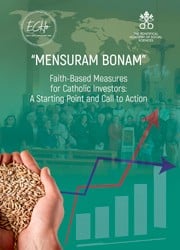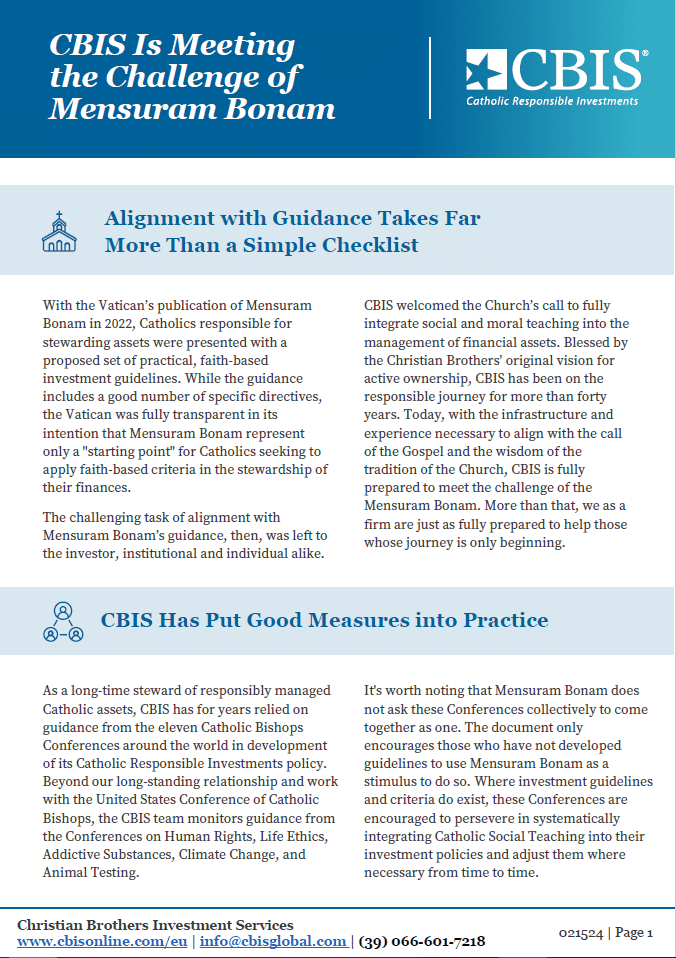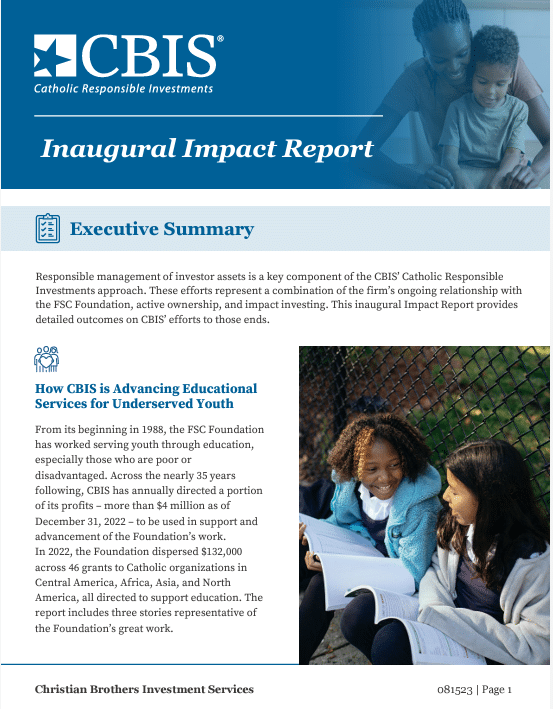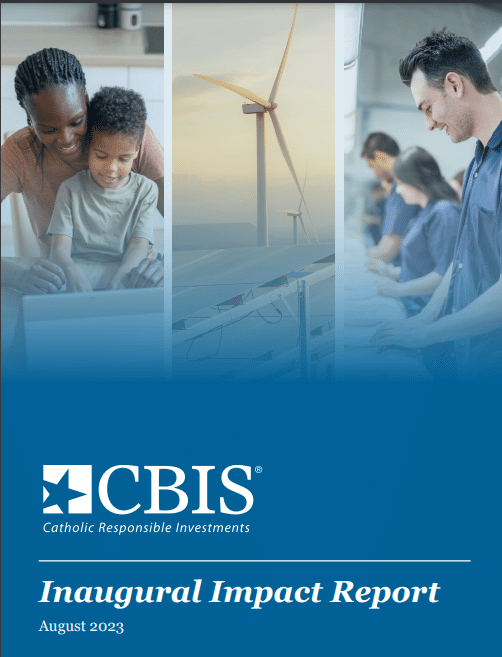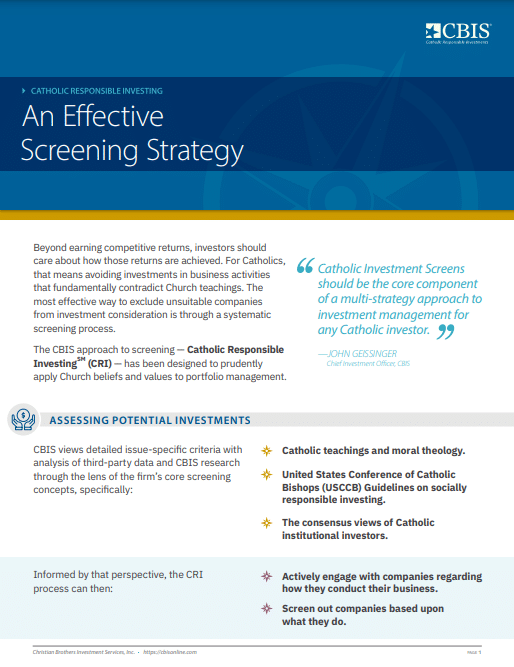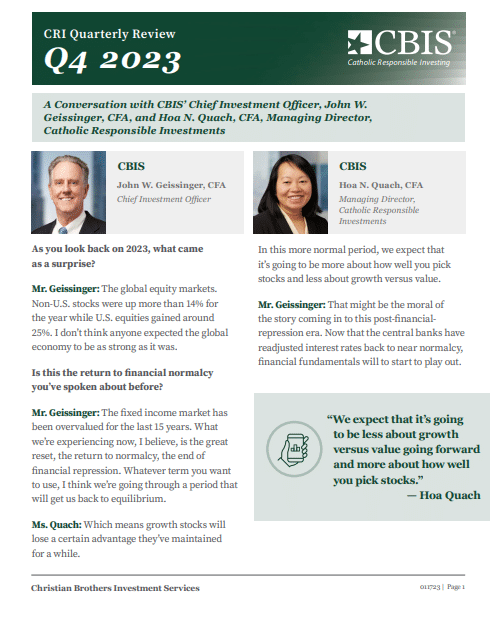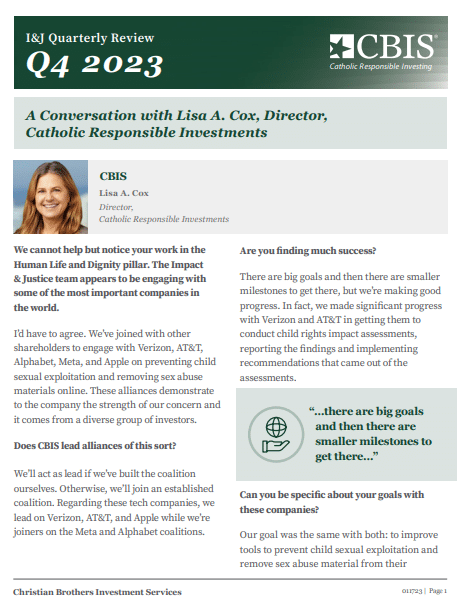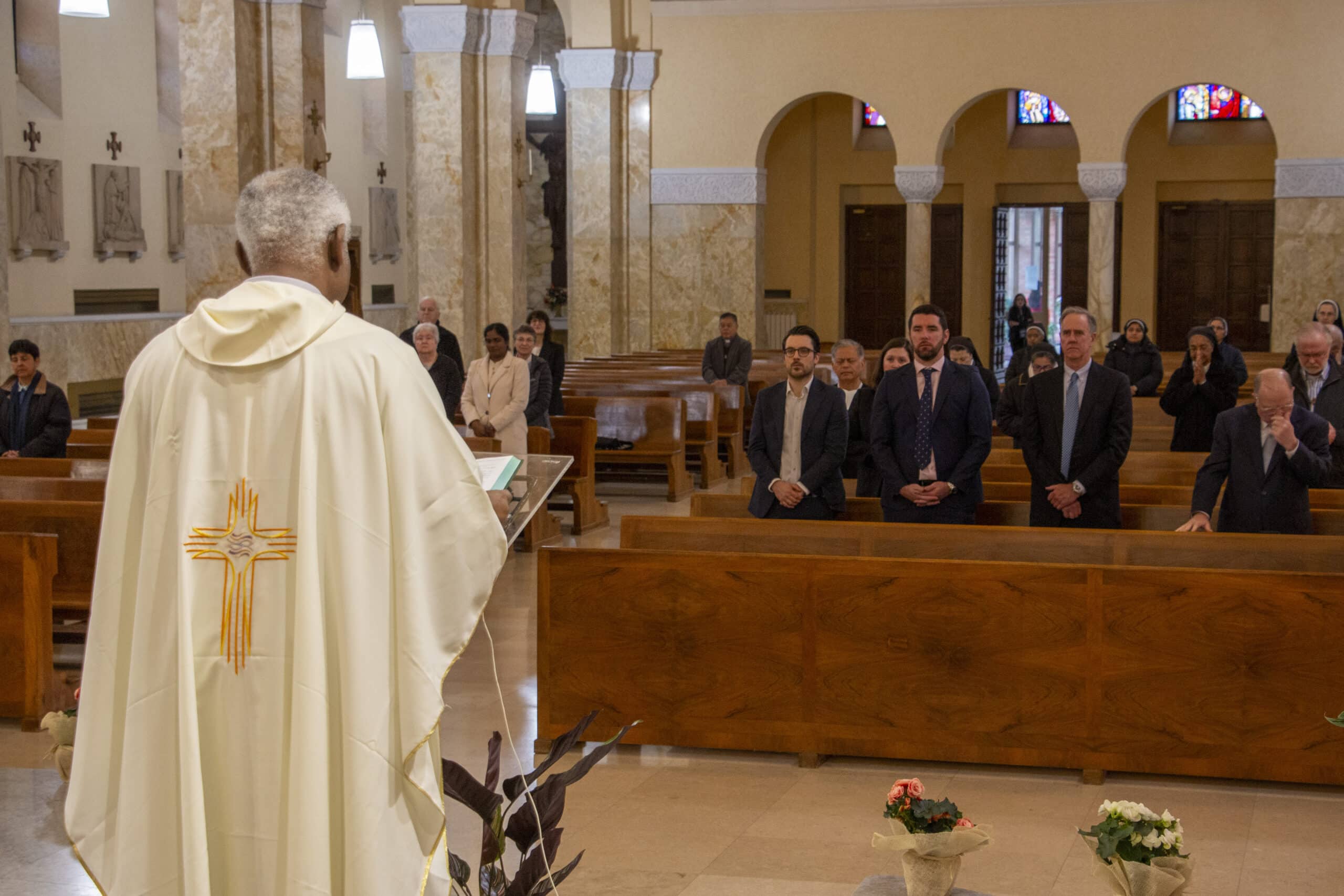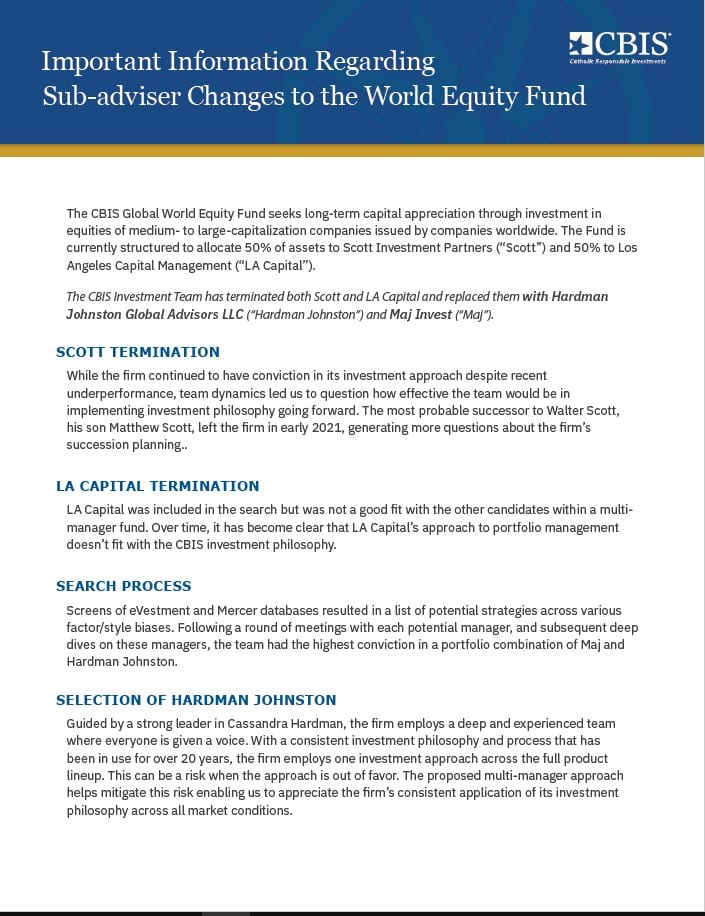In times of market volatility, it can feel like every headline reflects uncertainty in the market. But we must remember there is a difference between the signal and the surrounding noise…
To Our CBIS Investors and Partners,
We join the world in mourning the passing of His Holiness Pope Francis, who entered eternal rest following the celebration of the Easter Triduum and Easter Sunday. His final days were marked, as ever, by humility, prayer, and a quiet devotion to the Gospel.
Pope Francis will be remembered as a living example of Christ’s message—offering love, dignity, and accompaniment to all, especially those who have been marginalized or overlooked. His pontificate reflected a deep commitment to empathy, pastoral care, and the renewal of the Church in service to humanity.
Among his many contributions, Pope Francis offered strong support for Mensuram Bonam, encouraging Catholic institutions to align their financial practices with their faith. His call for greater integrity in economic life continues to resonate across the global Church.
At CBIS, we have long been guided by this vision—serving Catholic investors who seek to transform the world through faith-consistent investing rooted in Catholic social teaching. We pray that the momentum Pope Francis inspired through this work will continue to grow in the years ahead.
In keeping with his character, Pope Francis requested that his funeral rites be simple, focused not on the trappings of papal office but on his identity as a disciple and servant of Christ. His humility and example leave a lasting imprint on the Church—and on all who seek to live the Gospel with integrity.
We offer our prayers for the College of Cardinals as they gather in solemn discernment to choose the next Pope. May the Holy Spirit guide their hearts and minds with wisdom, unity, and grace as they carry out this sacred responsibility for the good of the Church and the world.
May he rest in the peace of Christ.
Jeffrey A. McCroy
President & Chief Executive Officer
Empowering Investments for Positive Change: Insights from the 2024 Global Conference in Rome
On February 20, 2024, CBIS hosted the annual CBIS Global Conference in Rome. The event brought together investment and industry leaders, investors, and special guests worldwide. Themed “Empowering Investments for Positive Change,” the conference focused on market outlook and CBIS’ commitment to evangelize the message of Mensuram Bonam and Catholic Responsible Investing.
The event commenced with Mass celebrated by His Eminence Cardinal Peter Kodwo Appiah Turkson. Andrea Favaloro, President of CBIS Global, opened the conference, discussing the importance of Catholic Responsible Investing. , followed by a welcome by Br. Armin Luistro, FSC, Brother Superior of the Institute of the Brothers of the Christian Schools.
The session, “The Church and Mensuram Bonam” and was led by CBIS’ President & CEO, Jeffrey McCroy, with panelists and contributors of Mensuram Bonam, Reverend Father Séamus Finn, OMI, Chief of Faith Consistent Investing at Oblate International Pastoral Investment Trust, and John Dalla Costa, Founding Director at the Centre for Ethical Orientation. The conversation explored Mensuram Bonam’s fundamentals, its practical application, and the intersection of faith and finance.
Garvan McCarthy, Mercer’s Chief Investment Officer for Europe, the Middle East and Asia, and John Geissinger had a session wherein they shared their insights into the current market outlook and emerging opportunities.
A panel discussion on CBIS’ approach to investing in line with Mensuram Bonam was led by CBIS’ Chief Marketing Officer, Sarah McClain, and featured Jeffrey McCroy, John Geissinger, Chief Investment Officer, and Julie Tanner, Managing Director – Catholic Responsible Investments. The discussion focused on how Mensuram Bonam’s call to “engage, enhance, and exclude” reaffirms CBIS’ Catholic Responsible Investments approach.
The 2024 Global Conference in Rome was an opportunity to heed the Vatican’s call to action through Mensuram Bonam, discuss CBIS’ approach to investing in line with Mensuram Bonam, and provide an outlook of the financial markets. We are grateful for the opportunity to connect with our global investors and partners, reaffirming our dedication to empowering investments for positive change.
Conference Resources:
All material of opinion reflects the judgement of the Adviser at this time and is subject to change. This material is not intended as an offer or solicitation to buy, hold, or sell any financial instrument or investment advisory services.
“YOU ARE THE LIGHT OF THE WORLD”
As we look back on a particularly challenging year, I’m reminded once again of scripture. You might recognize the line above from Matthew. In full context, the verse speaks to the miracle of light — the idea that it’s in us all, regardless of circumstances — and that something so precious should not be wasted.
As we head into 2023, we feel optimistic and grateful for our amazing team and incredible investors at CBIS.
During a time when it is easy to only focus on darkness, we choose to look for the light.
By now, most everyone’s aware the United States Conference of Catholic Bishops – the USCCB – approved new investment Guidelines at its 2021 General Assembly. The updates, extensive by our account, were overwhelmingly approved by the full body of U.S. Bishops.
Here’s a big point: This is the first update to the USCCB guidance in 18 years.
We know the Guidelines help inform investment decisions of a countless number of Catholic religious communities, dioceses, colleges, church organizations, and individual investors around the U.S.
It’s worth remembering that they don’t have to.
The Guidelines are, in fact, intended for the USCCB itself– its operations, its funds, its monies. The Conference is not a regulatory agency. Even if a bishop voted for the Guidelines at the plenary session, he could still do something different in his own diocese. Catholic investors choose to align their investments with the Guidelines at their own discretion.

Key Takeaways from the 2021 Guidance
While the CBIS investment team is still analyzing the new guidance, we can already suggest there are FOUR notable attributes to highlight in the update.
- The guidance was developed through a very thoughtful process
The new Guidelines were drafted by the USCCB staff under the leadership of a Bishops’ Working Group, chaired by the USCCB Treasurer, Bishop Gregory L. Parkes of the Diocese of St. Petersburg.
The working group’s efforts began with a survey of all U.S. Bishops and included meetings with external subject matter experts as well as ESG research providers. The final document was sent out to every Bishop in the United States well in advance of the Conference. Any bishop could offer a modification he wanted to see individually. A good number did.
- The Guidelines emphasize a holistic policy approach
The new Guidelines incorporate teachings of both Pope Benedict and Pope Francis and they intricately connect five major categories of USCCB policies:
- Protecting Human Life,
- Promoting Human Dignity,
- Enhancing The Common Good,
- Pursuing Economic Justice, and
- Saving Our Global Common Home.

- The USCCB will periodically review the Guideline’s relevance
In carrying out its investment strategies, the USCCB will now review the Guideline’s relevance every three years. We think this is a huge breakthrough. Remember, the last time the Guidelines were reviewed was 18 years ago. A regular review will keep the guidance fresh and relevant.
The Bishops are still figuring out exactly what the review will look like – when it will happen, how it will be done, and so on.
- The updated Guidelines reaffirm and expand prior investment strategies
The final attribute to note is that the Guidelines reaffirm and expand a number of existing investment strategies. The USCCB investment strategies to avoid doing harm as well as to actively work for change as an investor were both reaffirmed and significantly extended.
The Guidelines also again require a refusal to invest in companies whose products and/or policies are counter to the values of Catholic moral teachings or statements by the Conference itself. This guidance includes any decisions not to invest in the first place, as well as divesting. Likewise, the Guidelines again require the use of the Conference’s position as shareholder and part owner to engage companies through dialogue with management, voting at corporate meetings, and supportive resolution.

What happens next?
CBIS will continue to comprehensively analyze the robust list of specific policies the USCCB has articulated.
Like you, we are deeply troubled by the recent attacks on Ukraine. As brothers and sisters in Christ, and on Ash Wednesday, we pray for a swift and peaceful resolution. We pray especially for the poor and vulnerable who are most impacted in times of crisis and conflict. And we pray for the continued strength and courage of the leadership and citizens of Ukraine.
While we cannot predict the outcome in Ukraine, we want to share our thoughts on how this might impact global financial markets and economies and discuss exposure to Russia in our funds.
October 21, 2021 marks an important milestone in CBIS history as we celebrate 40 years of serving Catholic investors. The anniversary comes at a pivotal time as we look forward to The Transformation in December and the opportunity to serve even more Catholic investors who seek to transform the world.
Thank you to those who have made this anniversary possible, including former CBIS’ leadership, our shareholders, our investors, and our employees.
We thank you for your trust as we work to help Catholic investors who are looking to transform the world.
